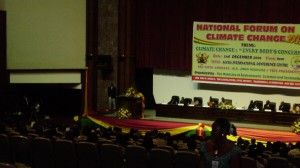In the lead-up to Copenhagen, RAN Ghana participated in a forum to discuss their country’s negotiating position for the international climate talks and what their government can do about climate change. This report comes from RAN Ghana’s John Akwetey.
It was December 2nd, and the weather looked very bright as the sun rose and the breeze blew from the ocean side towards the Accra International Conference Center, the venue of the 2009 National Climate Change Forum.
As the delegates arrived at the venue to kick start the talk, I talked with some of the delegates about their expectations. I was not very impressed with their answers. It looked to me like a lot of them don’t have any plan ahead of the National Climate Change forum. At about 9:58 am, the Vice President H.E. John Dramani Mahama arrived at the venue, but prior to his arrival was the Minister of Environment, Science and Technology, Ms. Sherry Ayittey and other dignitaries.

The Event started on a very soft note with an opening prayer, followed by the introduction of the Chairman for the occasion. The theme for the event was Climate Change: Everybody’s Concern. At the end of the forum, most of the speakers’ views were centered on the negotiation position that the COP-15 summit in Copenhagen should result in developed countries providing money to the developing countries to help them reduce their own emissions.
I was not fully in support of that idea – or rather, I didn’t think it was sufficient. As RAN Ghana works to protect our environment and human rights issues, we believed that Climate change has great significance for sustainable development plans, life and livelihoods in Ghana and across Africa. Many developing countries, including Ghana, are unable to cope with current climate variability, let alone cope with the medium and longer-term impacts of projected changes. Floods and droughts, Food Supply, Human Health, Settlements and Infrastructure, Desertification, Water Resource, Natural Resource Management and Biodiversity for example, continue to challenge the success of poverty reduction programs since relief and rehabilitation effort reduce budget, which sometimes received huge financial support from developed countries, that should have been used for developmental purposes. The developed countries should not only make available financial and technical assistance for developing countries but, they themselves should also cut down their greenhouse gas emission so that the money and assistance can go a long way to help mitigate the problem of climate change.
